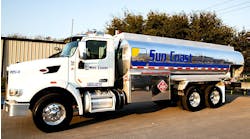Cultivate your vices so you'll have something to throw over when things get rough, was Mark Twain's wry advice to his friends. While Twain had cigars and whiskey in mind at the time, he'd probably be quick to see engine idling as the trucking industry's "saving vice" during these fuel-troubled days.
"Thank heaven you still have something to give up!" Twain would rejoice with us. "Perfect!" He'd be right, too. Giving up idling truck engines to run HVAC systems and power appliances would be like throwing over heavy cargo when your boat is taking on water in high seas. It just might save the day, or at least more of your profits.
Doing the old familiar math equation with the new fuel prices as the multiplier is a persuasive exercise. For example, if idling burns about one gallon of diesel per hour, then a truck that idles seven hours a day burns seven gallons of diesel during that time. At the current $2/gal. price, that equals $14/day/truck for idling. In other words, a fleet of 500 trucks could be spending $7,000/day to go nowhere.
There was a time when engine idling was a necessity because there really were no other options. Today, however, fleets can have power for heat, cooling, and appliances without idling, thanks to a host of idling alternatives from diesel-powered generators to auxiliary climate control systems and inverter/chargers that allow trucks to use alternating electrical current. Still other options, such as fuel cells, will be available in the future.
One of the most exciting new idling alternative projects is being led by Trace Engineering, Arlington, Wash., a supplier of high-performance inverter/chargers for heavy-duty trucks. Trace's Truck Series inverter/chargers are designed to convert battery DC power to AC to run equipment, electronics, and other appliances.
This spring, Trace plans to launch an experimental project to gauge the potential cost savings and other benefits of using AC power in place of idling. "All the technologies exist to enable trucks to use AC power; what's missing today is the coordination," says Gary Wilson, general manager for Trace's Heavy-Duty Truck Group.
"We plan to work with selected fleet partners to install Trace inverter/chargers and 110-volt HVAC systems on some of their vehicles. To prove the value of AC power, we'll also place generators, high-power inverter/chargers, solar panels and battery banks capable of handling about six trucks each at their terminals or at participating truckstop locations," he adds. "Then we'll gather data comparing the cost of plugging into the AC power system versus the cost of idling. We'll also be monitoring driver satisfaction.
"Everyone knows the cost of bringing electricity to truckstops and terminals is a big issue, and these facilities can't be expected to bear the cost alone, so we are also inviting truckstops, various regulatory agencies, government offices, and Clean City Coalitions to participate in the discussions," Wilson adds. "The Department of Energy, for example, has been discussing introducing a bill that would provide tax incentives to cut diesel fuel usage and emissions caused by idling."
Trace is currently lining up fleet partners for the test phase of the project, scheduled to begin in late April. An informational meeting, open to all interested parties, is planned for June in conjunction with the International Trucking Show in Las Vegas. If you are interested in participating in the test or for more information, contact the Heavy-Duty Truck Group of Trace Engineering at www.truckinverter.com or call 360-435-8826.
Of course, there's one obvious problem with all this: If trucking gives up idling now, what will be left to throw over the next time things get tough?


